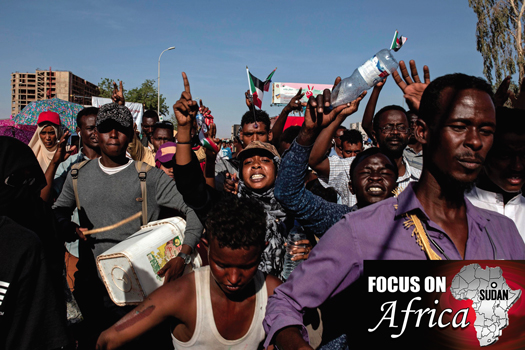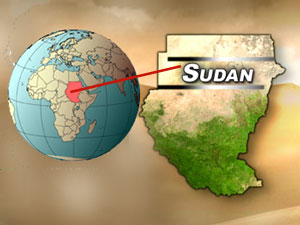Sudan in transition—End of an era?
By Brian E. Muhammad -Contributing Writer- | Last updated: Apr 24, 2019 - 9:33:31 AMWhat's your opinion on this article?

Demonstrators rallied near the military headquarters in Khartoum, Sudan, recently. Photo: Salih Basheer/Associated Press
|
Thousands are still in the streets of Khartoum intensifying pressure on the Military Transitional Council that took power in Sudan in an early April coup d’état that toppled the government of long-time President Omar al-Bashir. Since the coup, a tug-of-war between opposition groups and the transzonal council over the terms of change have been raging.
Observers of the turmoil say the events can be understood in the context of austerity measures that spawned massive 70 percent inflation, unbearable price hikes and domestic dissatisfaction. The people experienced a strained cost of living replete with cash shortages and unpaid salaries. These policies coupled with adverse foreign aspirations—primarily of the United States—to undermine the Sudanese Islamic influenced government lent to the situation.
The austerity measures were part of larger economic reforms proposed by the International Monetary Fund (IMF). Sudan’s economy was already struggling from the effects of recently ended United States sanctions and a 75 percent shortfall of oil revenues after the partition of its southern region in 2011.
“We have to take an overall look at the picture of what’s happening,” said Akbar Muhammad, international representative of the Nation of Islam.

|
“As we look at the events in Sudan, we have to look back on the ‘so-called’ Arab spring,” said Mr. Muhammad. He was referring to protests that gripped North African and Arab governments in 2011 that toppled leaders. Some analysts said the uprisings were foreign manufactured.
“In all cases came more chaos, not democracy,” added Mr. Muhammad.
Whether it’s Tunisia, Libya, Algeria and now Sudan. “All of them have serious problems, because they have allowed the West to wean itself in their affairs,” he said.
For many years, they didn’t like Mr. al-Bashir’s close relationship with the Palestinians and the fact that Osama Bin Laden had refuge there. “America always wanted him out,” reasoned Mr. Muhammad.
Although the 75-year-old leader eventually partnered with the U.S. in the war on terrorism and is now overthrown, the U.S. State Department announced the Sudan designation on the list of state sponsors of terrorism will remain for now. The status was imposed on Sudan since 1997 over accusations that Mr. al-Bashir backed militant revolutionary groups, including Hamas and Hezbollah.
“This has all of the fixings of American Black Ops and CIA written all over it,” said Malik Aziz of the Darfur 23 group, a U.S. based activist organization. “The CIA has been on the ground (and) the Black Ops been on the ground there a longtime,” he added.
Mr. Aziz portends the U.S. wants to militarily coopt the whole situation for geostrategic aims. The U.S. wants to ultimately expand its footprint in Northern Africa for its Africa Military Command—AFRICOM. Sudan borders 11 African nations.
“They see Sudan … as a strategic military outpost,” Mr. Aziz told The Final Call.
Days leading up to the April 11 coup, pressure reached a boiling point April 6 with fatal clashes between security forces and protestors.
The Military Transitional Council suspended the constitution, pledged a two-year transition to civilian rule and declared a three-month state of emergency. A day after the coup, the interim leader and former Defense Minister Ahmad Awad Ibn-Auf resigned from heading the transition government. Earlier this year Mr. Ibn-Auf was named first vice-president and was a trusted companion of Mr. al-Bashir. He was part of the 1989 bloodless coup that ushered the ex-leader to power. To protestors, Mr. Ibn-Auf heading the transition was a contradiction because of his role in the former government.
The Transitional Council swore in Abdel Fattah Abdelrahman al-Burhan, a lieutenant general and number three military official to lead the transition. Mr. al-Burhan ordered the release of people arrested under Mr. al-Bashir’s emergency laws and opened talks with opposition groups. The new interim leader stuck to the two-year transition plan which some people doubt.
“Many countries have tried that,” said Akbar Muhammad. “The history of African countries shows in most cases, military rulers hold power much longer than promised,” he said.
More changes followed with the resignation of the National Intelligence and Security Service chief Salah Gosh, a central figure blamed for suppression of antigovernment protests. Media reported arrests of senior officials in the fallen National Congress Party and neighboring Uganda has offered Mr. al-Bashir asylum if he seeks it.
When the military seized power, activists celebrated Mr. al-Bashir’s removal, however rejected military rule as a difference without change.
Experts say distrust of the coup makers is rooted in past experience. In 1958 with Ibrahim Abboud; 1969 with Gaafar Nimeiry and 1989 with Mr. al-Bashir—each rising to authority via coups, only this time the people are pushing back on the military, demanding an immediate power transfer to civilians.
“The developments in Sudan…have seen the oppressed rise up against the coup,” said political analyst Hazem Saghieh, in an Asharq Al-Awsat op-ed.
Attempting to ease distrust, the Military Council denied being an extension of the ousted government and promised transitional inclusion. “We deny the allegations the military council is a continuation of the old regime,” said Omar Zain Abideen, the Chief of Military Political Council. “We acted to remove the president to meet the demands of the people” he said.
Protestors discarded the reassurances and stayed in the streets outside the Defense Ministry refusing to be deterred.
“They will make us suffer, so that is why we insist that the sit-in continues,” Abubakr al-Awad, 23, told Associated Press. “They said they want to stay for two-years, we will stay three years.”
The Sudanese Professional Association, an umbrella organization of protestors, said: “We assert that our revolution is continuing and will not retreat or deviate from its path until we achieve ... our people’s legitimate demands of handing over power to a civilian government,” it said in a statement.
Mr. Al-Bashir’s fall marks the end of an era of a leader whose thirty-year rule was marred by turmoil in the country’s western region and a civil war ending with the secession of its oil rich South becoming South Sudan, Africa’s 54th country. World bodies condemned the coup.
“The military take-over is not the appropriate response to the challenges facing Sudan and the aspirations of its people,” said Chairperson of the African Union Commission, Moussa Faki Mahamat in a statement.”
In a April 15 statement on the situation, the AU Peace and Security Council expressed “deep concern” about the military coup and its “impact on the country, the region and the Continent,” in a context where Sudan already faces challenges.
The conflict resolution body echoed demands for a transitional civilian-led authority, within 15 days or Sudan will be barred from participation in the AU until constitutional order is restored.
Federica Mogherini, European Union foreign minister, urged Sudan’s military to swiftly relinquish power.
“Only a credible and inclusive political process can meet the aspirations of the Sudanese people and lead to the political and economic reforms the country needs,” Ms. Mogherini said in a statement.
“That can only be achieved through a swift handover to a civilian transitional government,” she added.
The online RegionWeek reported the military council said a civilian prime minister and cabinet minister would be named to help govern, stopping short to name a civilian to the presidency.
Mr. Abideen told the press April 12, Mr. al-Bashir will not be transferred to the International Criminal Court. It issued arrest warrants against him in 2009 and 2010 on alleged genocide charges stemming from civil strife in Darfur, in the Sudan’s western region.
He said Mr. al-Bashir will be tried in Sudan. However, after the transition, the civilian government will be free to do as they wish. For now, only time will tell.
“We have to wait and see,” said Mr. Muhammad.
INSIDE STORIES AND REVIEWS
-
-
About Harriett ... and the Negro Hollywood Road Show
By Rabiah Muhammad, Guest Columnist » Full Story -
Skepticism greets Jay-Z, NFL talk of inspiring change
By Bryan 18X Crawford and Richard B. Muhammad The Final Call Newspaper @TheFinalCall » Full Story -
The painful problem of Black girls and suicide
By Charlene Muhammad -National Correspondent- » Full Story -
Exploitation of Innocence - Report: Perceptions, policies hurting Black girls
By Charlene Muhammad -National Correspondent- » Full Story -
Big Ballin: Big ideas fuel a father’s Big Baller Brand and brash business sense
By Bryan Crawford -Contributing Writer- » Full Story






 Click Here Stay Connected!
Click Here Stay Connected!








